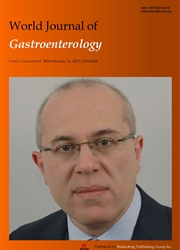

 中文摘要:
中文摘要:
AIM:To investigate the effects of N-acetylcysteine(NAC) on endoplasmic reticulum(ER) stress and tissue injury during liver ischemia reperfusion injury(IRI).METHODS:Mice were injected with NAC(300 mg/kg) intraperitoneally 2 h before ischemia.Real-time polymerase chain reaction and western blotting determined ER stress molecules(GRP78,ATF4 and CHOP).To analyze the role of NAC in reactive oxygen species(ROS)-mediated ER stress and apoptosis,lactate dehydrogenase(LDH) was examined in cultured hepatocytes treated by H2O2 or thapsigargin(TG).RESULTS:NAC treatment significantly reduced the level of ROS and attenuated ROS-induced liver injury after IRI,based on glutathione,malondialdehyde,serum alanine aminotransferase levels,and histopathology.ROS-mediated ER stress was significantly inhibited in NAC-treated mice.In addition,NAC treatment significantly reduced caspase-3 activity and apoptosis after reperfusion,which correlated with the protein expression of Bcl-2 and Bcl-xl.Similarly,NAC treatment significantly inhibited LDH release from hepatocytes treated by H2O2 or TG.CONCLUSION:This study provides new evidence for the protective effects of NAC treatment on hepatocytes during IRI.Through inhibition of ROS-mediated ER stress,NAC may be critical to inhibit the ER-stressrelated apoptosis pathway.
 英文摘要:
英文摘要:
AIM: To investigate the effects of N-acetylcysteine (NAC) on endoplasmic reticulum (ER) stress and tissue injury during liver ischemia reperfusion injury (IRI).
 同期刊论文项目
同期刊论文项目
 同项目期刊论文
同项目期刊论文
 Drainage by urostomy bag after blockage of abdominal drain in patients with cirrhosis undergoing hep
Drainage by urostomy bag after blockage of abdominal drain in patients with cirrhosis undergoing hep Triptolide alleviates hepatic ischemia/reperfusion injury by attenuating oxidative stress and inhibi
Triptolide alleviates hepatic ischemia/reperfusion injury by attenuating oxidative stress and inhibi Triple expression of B7-1, B7-2 and 4-1BBL enhanced antitumor immune response against mouse H22 hepa
Triple expression of B7-1, B7-2 and 4-1BBL enhanced antitumor immune response against mouse H22 hepa Generation of human regulatory T cells de novo with suppressive function prevent xenogeneic graft ve
Generation of human regulatory T cells de novo with suppressive function prevent xenogeneic graft ve Lithium exacerbates hepatic ischemia/reperfusion injury by inhibiting GSK-3beta/NF-kappaB-mediated p
Lithium exacerbates hepatic ischemia/reperfusion injury by inhibiting GSK-3beta/NF-kappaB-mediated p Lipopolysaccharide preconditioning protects hepatocytes from ischemia/reperfusion injury (IRI) throu
Lipopolysaccharide preconditioning protects hepatocytes from ischemia/reperfusion injury (IRI) throu All-trans retinoic acid promotes TGF-beta-induced Tregs via histone modification but not DNA demethy
All-trans retinoic acid promotes TGF-beta-induced Tregs via histone modification but not DNA demethy Lithium exacerbates hepatic ischemia/reperfusion injury by inhibiting GSK-3 beta/NF-kappa B-mediated
Lithium exacerbates hepatic ischemia/reperfusion injury by inhibiting GSK-3 beta/NF-kappa B-mediated 期刊信息
期刊信息
